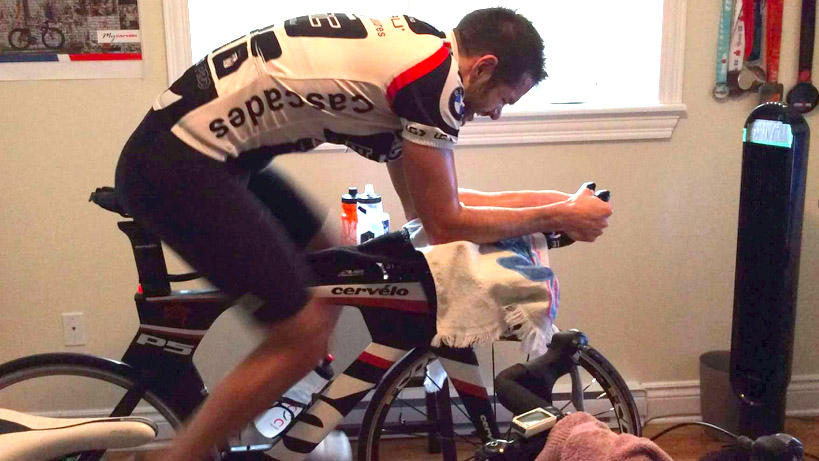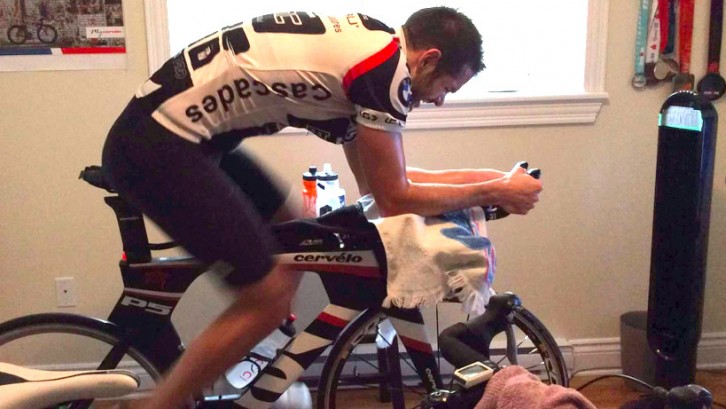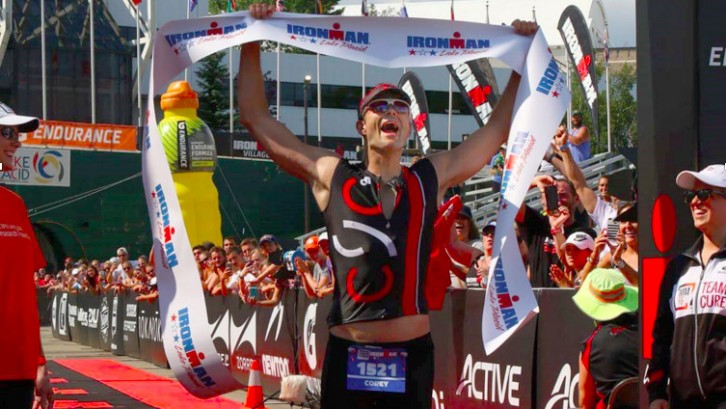Ironman
Teacher training
Extreme endurance with a full-time job

caption
Deveaux trains in the Spartan surroundings of his front room. The weather can be pretty rough in Nova Scotia and it is often easier to train in a more controlled, indoor environment.
caption
Deveaux trains in the Spartan surroundings of his front room. The weather can be pretty rough in Nova Scotia and it is often easier to train in a more controlled, indoor environment.The race had gone on for an impossibly long time. The cold water and steep hills have challenged Corey Deveaux, but the pain is nearly over. Finally the finish line appears. His body has struggled in the heat, but at no point has his mind faltered.
“It literally was the perfect race mentally,” says Deveaux. “I enjoyed every bit of it.”
A month later, “Mister” Deveaux is standing in front of a Grade 7 class. He isn’t there to talk about his triathlon heroics. He’s there to teach math and science.
In July, Deveaux, 31, completed the Ironman triathlon in Lake Placid, N.Y., in nine hours, 31 minutes and nine seconds. He won by more than three minutes. Just completing an ironman triathlon is an unreachable challenge for most people. Remarkably, Deveaux achieved this victory alongside having a full-time job as a teacher.
Deveaux’s drive for success means that most days start at 5:30, when he gets up for a swim before work. On top of at least 30 hours teaching at the local school in Sydney, N.S., Deveaux tries to fit in up to 15 hours of training each week. In addition, he has a girlfriend and an active social life.
“You’re trying to keep everybody happy all the time, including yourself. So it can be difficult,” he says.
Deveaux’s coach, Jesse Van Nieuwenhuyse, says that balance is important and that it’s crucial to build a personal training plan.
“Listening to Corey is key,” says Van Nieuwenhuyse. “I have to work around his job.”

caption
Deveaux crosses the finish line of the Lake Placid Ironman Triathlon in first place. All the pain and sacrifice has been worth it.Van Nieuwenhuyse says Deveaux is an excellent communicator. This means he receives feedback from Deveaux and understands his commitments, so they can structure training around his priorities and time constraints.
Deveaux’s routine is in stark contrast with the lifestyle of a professional triathlete such as John Dahlz. He has an impressive list of achievements, including being U.S. Collegiate National Champion in 2009. At his peak, Dahlz would train for up to 30 hours a week, but outside of training, all he really did was eat, sleep and recover.
Dahlz says, “Stress is stress. It doesn’t matter if it’s coming from work or from a workout.”
One aspect that seems constant in every top athlete, amateur or professional, is an appetite for sheer hard work.
Deveaux’s desire is evident from his strict commitment to his training plan, pushing through even the toughest sessions. He rarely misses a workout, although very occasionally he skips a swim when real life has been particularly exhausting.
This drive to endure such a punishing regime delivered Deveaux to the start of the Lake Placid triathlon in his best ever condition.
“I’d never been more ready for an Ironman than I was that day,” says Deveaux.
He was in fourth at the end of the bike leg, but ran the second fastest marathon of the day to claim the overall victory. He hit the front with 13 kilometres to go and never looked back. His fitness showed through despite extremely hot conditions.
Deveaux now hopes to put in a couple of years of hard training before tackling the Ironman World Championships in Hawaii in 2018.


V
Vivian MacNeil